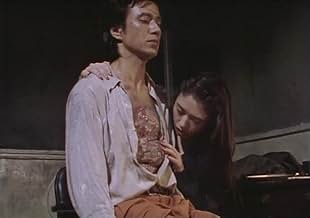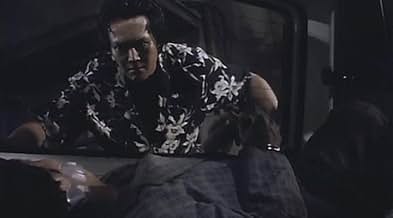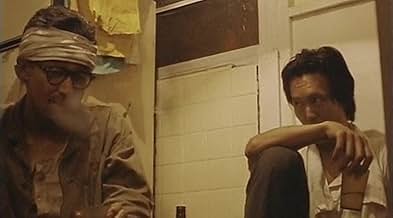Two police detectives Numata and Tosaka infiltrate a group of underground black market human organ dealers. Things go haywire during a raid on the group's surgical headquarters.Two police detectives Numata and Tosaka infiltrate a group of underground black market human organ dealers. Things go haywire during a raid on the group's surgical headquarters.Two police detectives Numata and Tosaka infiltrate a group of underground black market human organ dealers. Things go haywire during a raid on the group's surgical headquarters.
- Director
- Writer
- All cast & crew
- Production, box office & more at IMDbPro
5.3655
1
2
3
4
5
6
7
8
9
10
Featured reviews
Uh...hmmm.
Ultra-auteur (writer, director, DP & star) Kei Fujiwara takes a bold step into a bloody landscape where Cronenburg drops acid with Lynch as D. Argento serves up livermush sandwiches to the late Mr. Fulcio.
Fine. Unfortunately she forgot to bring along some extra flashlights to brighten up her plethora of grainy, murky scenes, and pack a script that was at least halfway finished before production commenced. Not so fine.
Engrossing in some scenes, but infuriatingly obtuse throughout, ORGAN needs at least SOME sort of linear spine to hang its meat hooks on (and more violence would to boot). While watching the film, one senses that many scenes could have been cut in any order, and it still wouldn't affect the narrative much. Sigh. Still, it's required viewing for any blind dates, or first-time meetings with a potential mother-in-law!
Fine. Unfortunately she forgot to bring along some extra flashlights to brighten up her plethora of grainy, murky scenes, and pack a script that was at least halfway finished before production commenced. Not so fine.
Engrossing in some scenes, but infuriatingly obtuse throughout, ORGAN needs at least SOME sort of linear spine to hang its meat hooks on (and more violence would to boot). While watching the film, one senses that many scenes could have been cut in any order, and it still wouldn't affect the narrative much. Sigh. Still, it's required viewing for any blind dates, or first-time meetings with a potential mother-in-law!
Japanese orgies of flesh
Well, the first thing about Organ is, that you should not try to understand the storyline too much. This movie is extra-strange yet lives of its trashy and bizarre pictures. If you like purulent ulcerations exerbating and real weird erotics - it is the real thing for you. Don't expect a pure splatter movie but a picture with intense horror... To the story (as well as I can tell it): a biologist with a big mutation (spicy) cuts out organs from dead and alive people to sell them. After locking up the brother of a cop (whom he cuts off his limbs and letting him alive for unknown purposes) he is chased by the cop. And that's it...the rest evolves... Now to the effects: real cool sometimes, but also trashy and funny, butterfly collections, birthings, slimy blood-dripping...yet not state-of-the-art. Nice soundtrack also. For a conclusion, it's a real bizarre japanese splatting horror movie you should not miss if you want it different. I rate it a 7 of 10, but it has deserved a 10 for cult-factor.
A Misunderstood Gem
okay, I'm not going to even try to explain the plot of this unique film... instead i will say that "Organ" can honestly be considered one of the strangest, yet also most beautifully crafted, movies that i have ever had the pleasure of setting eyes on. Some will say that the director was just trying to use the back-story as an excuse to showcase graphic violence and gore in an attempt to gross-out and shock the viewer... but this is the furthest thing that i can conceive as being possible. Yes it is extremely graphic in it's depiction of the twisted inner-workings of the human soul, but the gist of the fact is that the director was trying to depict (or at least in my interpretation...) just that... that humans can be sick and perverse... even those who have been deemed to be social leaders. Granted, the first time you view this film, you may get lost. Between all the blood, violence, and distorted dream-like imagery you are sure to become at least a little confused (especially those of us who do not speak Japanese and are held captives to the subtitles). But upon subsequent viewings, i believe you will find that the story represents a masterful vision of the contrast of the conflicting sides of human personalities... even those of us who are trying to do good are not always saints... every man has his own dark side to him. Just please give this film a chance, and try not to be intimidated by the subject matter within. Instead, just allow yourself to take in all of the sights, sounds, images, and metaphors that are rooted so firmly in this film... and try not be overwhelmed... no matter how hard that may be... and i think you will find "Organ" to be as engrossing as I did.
disappointing, muddled mess
After reading how violent this film was and that it had been banned even in Japan, I must admit I was excited about seeing it. After watching it multiple times, I still can't get much plot out of it. I got more from reading the back of the case than from the movie... As for the supposed over-the-top gore, I wasn't impressed. The effects are straight out of a Henenlotter or HG Lewis flick and there are more greens and yellows than red. I saw nothing so offensive that it would need to be censored. Visually, the film was interesting, with very vibrant colors. Is it violent and perverse? Yes. Is it as bloody as it's billing? No. I think it was an incoherent mess, comparable to "Tetsuo".
10myboigie
Organ and our Hellish Human-condition
I'm astonished at some of the bad-reviews of this film--ignore them. If you love extreme cinema that explores the basis of the human-animal, you have found a home in the cinematic space-time continuum. Ostensibly, this is a Yakuza and detective film, with elements of film-noir and expressionism. It is not a purely genre film at-all, but an art-film with incredible complexity about what it is to be human. Fujiwara is best-known for her role in Tsukamoto Shinya's "Tetsuo: the Iron Man", and her relationship to his work shows here. The human-body is the battlefield, as well as the human-soul. Maybe it took an inspired woman to say this, and a Buddhist at-that. And in many-ways, this feels like a tale by Edgar Allan Poe! It has that feel to it, a very visceral, filth-covered psychology--what much real horror is. In-fact, I'd say it is on-par with Poe and his Japanese-analogue, "Edogawa Rampo" (a pen-name). This is a film I have watched several-times, and it always delivers a new-revelation. One-viewing is not enough to begin to understand it. If it is ugly, it is because life has ugliness. If it has beauty (it does), it is because life does.
There are roughly two narrative-paths in the film: first, the story of the outsider detective searching for his "dead" partner after their uncovering of a horrific black-market organ-smuggling ring run by Yakuza, and secondly, the story of the insiders of the ring, a brother-and-sister. The detective's-half reminded me strongly of Kurosawa's "Stray Dog" (aka "Nora Inu", 1949), and is probably a conscious-nod by Fujiwara. The brother has reanimated the lost-cop and is doing hellish experiments on him, while the sister--Yoko--runs the gang and fends-off the outside world. It's an interesting structure, which makes the film watchable numerous times, but the philosophical-themes of birth-and-death are even more rewarding. Yes, it is extremely low-budget, and shot in 16mm, but it is a well-executed film by a genuine maverick.
At the film's philosophical-center is the relationship with the surgeon-brother in the organ-ring, and the reanimated-cop. As grotesque as the half-dead cop appears, he is more human than the internally-diseased brother. In-fact, he is metaphor for the surgeon's remnants of humanity; Fujiwara makes it clear that the brother and sister were horribly-abused, the origin of their spiritual-decay and sadism. The reanimated-cop is hidden-away by the surgeon in a secret room, and they have an "internal-dialog." The other-half of the narrative is also very powerful, with the outsider detective's obsession with finding his partner taking a horrible-toll on his family. It seems that being a cop hasn't done him or his home any good--even before the body-snatching incident. Fujiwara paints life as-such: birth, mutilation at the hands of others, and finally, death. Sadly, this is the fate that awaits many human-beings in this inhuman era we inhabit. Out of this, one could surmise that Mrs. Fujiwara has a strong-ambivalence to motherhood. What is puzzling is why many women do not. This film is a contemporary-masterpiece. "Organ 2" has been completed, so expect more-of-the-same!
01.21.06 PS: It's hilarious how people don't get this incredible-film, but I believe it is still ahead-of-the-pack. American-audiences are used to a more linear-narrative structure, whereas audiences in Japan and Europe understand a film that is primarily thematic.
There are roughly two narrative-paths in the film: first, the story of the outsider detective searching for his "dead" partner after their uncovering of a horrific black-market organ-smuggling ring run by Yakuza, and secondly, the story of the insiders of the ring, a brother-and-sister. The detective's-half reminded me strongly of Kurosawa's "Stray Dog" (aka "Nora Inu", 1949), and is probably a conscious-nod by Fujiwara. The brother has reanimated the lost-cop and is doing hellish experiments on him, while the sister--Yoko--runs the gang and fends-off the outside world. It's an interesting structure, which makes the film watchable numerous times, but the philosophical-themes of birth-and-death are even more rewarding. Yes, it is extremely low-budget, and shot in 16mm, but it is a well-executed film by a genuine maverick.
At the film's philosophical-center is the relationship with the surgeon-brother in the organ-ring, and the reanimated-cop. As grotesque as the half-dead cop appears, he is more human than the internally-diseased brother. In-fact, he is metaphor for the surgeon's remnants of humanity; Fujiwara makes it clear that the brother and sister were horribly-abused, the origin of their spiritual-decay and sadism. The reanimated-cop is hidden-away by the surgeon in a secret room, and they have an "internal-dialog." The other-half of the narrative is also very powerful, with the outsider detective's obsession with finding his partner taking a horrible-toll on his family. It seems that being a cop hasn't done him or his home any good--even before the body-snatching incident. Fujiwara paints life as-such: birth, mutilation at the hands of others, and finally, death. Sadly, this is the fate that awaits many human-beings in this inhuman era we inhabit. Out of this, one could surmise that Mrs. Fujiwara has a strong-ambivalence to motherhood. What is puzzling is why many women do not. This film is a contemporary-masterpiece. "Organ 2" has been completed, so expect more-of-the-same!
01.21.06 PS: It's hilarious how people don't get this incredible-film, but I believe it is still ahead-of-the-pack. American-audiences are used to a more linear-narrative structure, whereas audiences in Japan and Europe understand a film that is primarily thematic.
Did you know
- ConnectionsReferences The Fly (1986)
- How long is Organ?Powered by Alexa
Details
Contribute to this page
Suggest an edit or add missing content


























